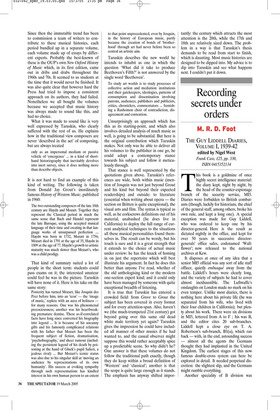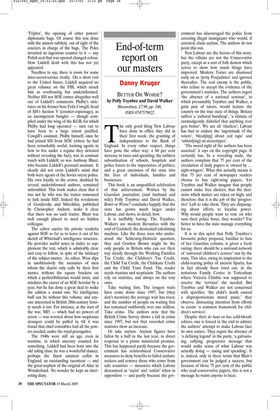Recording secrets under orders
M. R. D. Foot
THE GUY LIDDELL DIARIES, VOLUME I, 1939-42 edited by Nigel West Frank Cass, £25, pp. 330, ISBN 0415352134 This book is a goldmine of once highly secret intelligence material: the diary kept, night by night, by the head of the counter-espionage branch of the security service, MI5. Diaries were forbidden to British combatants (though, luckily for historians, the chief of the general staff, among others, broke his own rule, and kept a long one). A special exception was made for Guy Liddell, who was ordered to keep one by his director-general. Here is the result as dictated nightly in the office, and kept for over 50 years in successive directorgenerals’ office safes, codenamed ‘Wallflower’; now released to the national archives at Kew.
It disposes at once of any idea that a senior MI5 official was any sort of idle staff officer, quietly embusqué away from the battle. Liddell’s hours were clearly long, and the variety of subjects he had to cover almost inexhaustible. The Luftwaffe’s onslaughts on London made no mark on his even temper. Unlike most diaries, there is nothing here about his private life (he was separated from his wife, who lived with their four children in California); but plenty about his work. There were six divisions in MI5, lettered from A to F ; his was B, and the editor cites 20 sub-branches. Liddell kept a close eye on T. A. Robertson’s sub-branch, B1(a), which ran back — with, in the end, astounding success — almost all the agents the Germans thought they had implanted in the United Kingdom. The earliest stages of this now famous double-cross system can here be explored in detail. It needed perpetual discretion: the slightest slip, and the Germans might rumble everything.
Another speciality of B division was ‘Triplex’, the opening of other powers’ diplomatic bags. Of course this was done with the utmost subtlety, out of sight of the couriers in charge of the bags. The Poles invented an ingenious counter to it — any Polish seal that was opened changed colour. How Liddell dealt with this has not yet appeared.
Needless to say, there is room for some inter-secret-service rivalry. On a short visit to the United States, Liddell acquired no great reliance on the FBI, which struck him as overbearing but underinformed. Neither SIS nor SOE comes altogether well out of Liddell’s comments. Philby’s strictures on his former boss Felix Cowgill, head of SIS’s Section V (counter-espionage), as an incompetent bungler — though compiled under the wing of the KGB, for which Philby had long operated — turn out to have been to a large extent justified. Cowgill’s assistant, Philby himself, once he had joined SIS from SOE (where he had been remarkably useful, training agents in how to live under a regime they detested without revealing the fact), was in constant touch with Liddell; so was Anthony Blunt, who became Liddell’s personal assistant. It clearly did not cross Liddell’s mind that both were agents of the Soviet secret police. His own loyalty to the crown, doubted by several underinformed authors, remained untroubled. This book makes clear that it was not he who was the traitor rumoured to lurk inside MI5. Indeed the revelations of Gordievsky and Mitrokhin, published by Christopher Andrew, make it clear that there was no such traitor. Blunt was well enough placed to need no hidden colleague.
The editor carries his private vendetta against SOE so far as to leave it out of his sketch of Whitehall’s intelligence structure. He provides useful notes in italics to supplement the text, which is admirably clear and easy to follow, in spite of the intricacy of the subject-matter. As editor, West slips in unobtrusively the surnames of men whom the diarist only calls by their first names, without the square brackets on which a perfectibilitarian would insist, and misdates the career of an SOE heroine by a year, but he has done a great deal to make the edition a sound one. No intelligence buff can be without this volume; and anyone interested in British 20th-century history needs it too. For instance, at the start of the war, MI5 — which had no powers of arrest — was worried about how suspicious strangers could be pulled in, till it was found that chief constables had all the powers needed, under the royal prerogative.
The 1940s were still an age, even in wartime, in which ancestry counted for something. Liddell had been born into the old ruling class; he was a wonderful dancer, perhaps the finest amateur cellist in England, an outstanding raconteur — and the great-nephew of the original of Alice in Wonderland. No wonder he kept an interesting diary.

















































 Previous page
Previous page